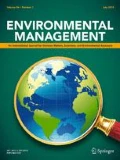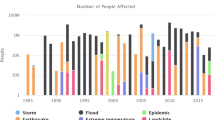Abstract
There are two principal strategies for managing climate change risks: mitigation and adaptation. Until recently, mitigation and adaptation have been considered separately in both climate change science and policy. Mitigation has been treated as an issue for developed countries, which hold the greatest responsibility for climate change, while adaptation is seen as a priority for the South, where mitigative capacity is low and vulnerability is high. This conceptual divide has hindered progress against the achievement of the fundamental sustainable development challenges of climate change. Recent attention to exploring the synergies between mitigation and adaptation suggests that an integrated approach could go some way to bridging the gap between the development and adaptation priorities of the South and the need to achieve global engagement in mitigation. These issues are explored through a case study analysis of climate change policy and practice in Bangladesh. Using the example of waste-to-compost projects, a mitigation-adaptation-development nexus is demonstrated, as projects contribute to mitigation through reducing methane emissions; adaptation through soil improvement in drought-prone areas; and sustainable development, because poverty is exacerbated when climate change reduces the flows of ecosystem services. Further, linking adaptation to mitigation makes mitigation action more relevant to policymakers in Bangladesh, increasing engagement in the international climate change agenda in preparation for a post-Kyoto global strategy. This case study strengthens the argument that while combining mitigation and adaptation is not a magic bullet for climate policy, synergies, particularly at the project level, can contribute to the sustainable development goals of climate change and are worth exploring.
Similar content being viewed by others
References
Agrawala S, Ota T, Ahmed AU, Smith J, van Aalst M (2005) Development and climate change in Bangladesh: focus on coastal flooding and the Sundarbans. Organisation for Economic Co-operation and Development (OECD)
Ahmed A, Alam M, Rahman A (1999) Adaptation to climate change in Bangladesh: future outlook. In: Huq S, Karim Z, Asaduzzuman M, Mahtab F (eds) Vulnerability and adaptation to climate change for Bangladesh. Kluwer Academic, New York
Alam M (2003) Bangladesh country case study for National Adaptation Programme of Action (NAPA) Workshop, Bhutan, BCAS, Dhaka, 9–11 September 2003
Brown K, Adger WN, Boyd E, Corbera-Elizalde E, Shackley S (2004) How do CDM projects contribute to sustainable development? Technical Report 16. Tyndall Centre for Climate Change Research, Manchester, UK
Burton I (2000) Adaptation to climate change and variability in the context of sustainable development. In: Gomez-Etcheverri L (ed) Climate change and development. Yale School of Forestry and Environmental Studies, New Haven, CT, pp 135–173
Cannon T (2000) Vulnerability analysis and disasters. In: Parker DJ (ed) Floods. Routledge, New York. Available at: http://radixonline.org/resources/cannon-floods-chapter.doc
Dang HH, Michaelowa A, Tuan DD (2003) Synergy of adaptation and mitigation strategies in the context of sustainable development: the case of Vietnam. Climate Policy 3:S81–S96
DOE (2006) Addressing climate change in Bangladesh: national efforts. Department of Environment, Ministry of Environment and Forest, Government of the Peoples Republic of Bangladesh, Dhaka. Unpublished
Dowlatabadi H (2007) On integration of policies for climate and global change. Mitigation and Adaptation Strategies for Global Change 12:651–663
European Commission’s Delegation to Bangladesh (2007) Bangladesh: European Community Country Strategy Paper for the period 2007–2013. European Commission
Forsyth T (2003) Critical political ecology: the politics of environmental science. Routledge Press, New York
Forsyth T (2007) Promoting the “development dividend” of climate technology transfer: Can cross-sector partnerships help? World Development 35:10
Golkany IM (2007) Integrated strategies to reduce vulnerability and advance adaptation, mitigation and sustainable development. Mitigation and Adaptation Strategies for Global Change 12:755–786
Hajer MA (1995) The politics of environmental discourse: ecological modernization and the policy process. Clarendon Press, Oxford, UK
Halsnaes K, Verhagen J (2007) Development based climate change adaptation and mitigation—conceptual issues and lessons learned in studies in developing countries. Mitigation and Adaptation Strategies for Global Change 12:665–684
Huq S, Ayers JM (2007) Critical list: the 100 most vulnerable nations to climate change. Sustainable development opinion. IIED, London
Huq S, Ayers JM (2008) Climate change impacts and responses in Bangladesh. Briefing note prepared for the European Parliament. International Institute for Environment and Development, London; and Policy Department Economic and Scientific Policy, DG Internal Policies of the Union, Brussels
Huq S, Burton I (2003) Funding adaptation to climate change: What, who, and how to fund? Sustainable development opinion. IIED, London
Huq S, Grubb M (2007) Preface. Mitigation and Adaptation Strategies for Global Change 12:645–649
Huq S, Reid H (2007) Community based adaptation: an IIED briefing. International Institute of Environment and Development, London
IPPC (Intergovernmental Panel on Climate Change) (2001) In: Watson RT, The Core Writing Team (eds) Synthesis report 2001—contribution of working group I, II and III to the third assessment report of the Intergovernmental Panel on Climate Change. Cambridge University Press, Cambridge, UK
IPCC (Intergovernmental Panel on Climate Change) (2007) Climate change 2007: impacts, adaptation and vulnerability. Working group II contribution to the Intergovernmental Panel on Climate Change Fourth Assessment Report: summary for policymakers. Cambridge University Press, Cambridge, UK
Jones RN, Dettmann P, Park G, Rogers M, White T (2007) The relationship between adaptation and mitigation in managing climate change risks: a regional response from North Central Victoria, Australia. Mitigation and Adaptation Strategies for Global Change 12:685–712
King DA (2004) Climate change science: Adapt, mitigate or ignore? Science 202:176–177
Kjellen B (2006) Forward. In: Adger WN, Paavola J, Huq S, Mace J (eds) Fairness in adaptation to climate change. MIT Press, Cambridge, MA
Klein, RJT, Huq S, Denton F, Downing TE, Richels RG, Robinson JB, Toth FL (2007) In: Parry ML, Canziani OF, Palutikof JP, van der Linden PJ, Hanson CE (eds) Inter-relationships between adaptation and mitigation. Climate change 2007: impacts, adaptation and vulnerability. Contribution of working group II to the fourth assessment report of the Intergovernmental Panel on Climate Change. Cambridge University Press, Cambridge, UK, pp 745–777
Litfin K (1994) Ozone discourses: science and politics in global environmental cooperation. Columbia University Press, New York
Lockwood H, Schoen P, Taher M (2006) DFID-Bangladesh: output to purpose review of Comprehensive Disaster Management Programme. A. Consultants, UNDP
MOEF (Ministry of Environment and Forest, Government of the People’s Republic of Bangladesh) (2005) National Adaptation Programme of Action. Final report. MOEF, Dhaka
Müller B (2002) Equity in climate change: the great divide. Oxford Institute for Energy Studies, Oxford
Munasinghe M, Swart R (2004) Primer on climate change and sustainable development: facts, policy analysis and applications. Cambridge University Press, Cambridge, UK
Oxfam International (2007) What’s needed in poor countries, and who should pay? Oxfam Briefing Paper. Oxfam International, Oxford, UK
Pielke R, Prins G, Rayner S, Sarewitz D (2007) Lifting the taboo on adaptation. Nature 445:597–598
Rahman A (1997) The South is acting. Our planet 9.3. Bangladesh Centre for Advanced Studies, Dhaka
Ravindranath NH (2007) Mitigation and adaptation synergy in forest sector. Mitigation and Adaptation Strategies for Global Change 12:843–853
Rozenweig C, Tubiello FN (2007) Adaptation and mitigation strategies in agriculture: an analysis of potential synergies. Mitigation and Adaptation Strategies for Global Change 12:855–873
Swart R, Raes F (2007) Making integration of adaptation and mitigation work: mainstreaming into sustainable development policies? Climate Policy 7:288–303
Taiyab N (2006) Exploring the market for voluntary carbon offsets. IIED, London
UNFCCC (United Nations Framework Convention on Climate Change) (1992) United Nations Framework Convention on Climate Change: convention text. UNFCCC, Bonn
UNFCCC (United Nations Framework Convention on Climate Change) (2002) The Delhi ministerial declaration on climate change and sustainable development. UNFCCC, Bonn
Venema HD, Cisse M (2004) Seeing the light: adapting to climate change with decentralized renewable energy in developing countries. International Institute for Sustainable Development, Winnipeg, Canada
Venema HD, Rehman IH (2007) Decentralized renewable energy and the climate change mitigation-adaptation nexus. Mitigation and Adaptation Strategies for Global Change 12:875–900
Waste Concern (2005) Composting of organic waste in Dhaka: Project Design Document Form (CDM PDD). Version 2. Available at: http://cdm.int. Accessed March 9, 2007
Willbanks TJ, Sathaye J (2007) Integrating mitigation and adaptation as a response to climate change: a synthesis. Mitigation and Adaptation Strategies for Global Change 12:957–962
Wilbanks TJ, Kane SM, Leiby PN, Perlack RD, Settle C, Shogren JF, Smith JB (2003) Integrating mitigation and adaptation as possible responses to global climate change. Environment 45:28–38
Willbanks TJ, Sathaye J, Klein RJT (2007a) Introduction. Mitigation and Adaptation Strategies for Global Change 12(5)
Willbanks TJ, Leiby P, Perlack R, Ensminger JT, Wright SB (2007b) Toward an integrated analysis of mitigation and adaptation: some preliminary findings. Mitigation and Adaptation Strategies for Global Change 12:713–725
World Bank (2006) An investment framework for clean energy and development: a progress report. DC2006-0012. World Bank, Washington, DC
Acknowledgments
The authors would like to thank the reviewers of this piece, whose comments and recommendations contributed significantly to the improvement of the manuscript. Thanks also go to Dr. Tim Forsyth, London School of Economics, for his comments on early drafts of this work. We also acknowledge the Bangladesh Centre of Advanced Studies for their help in coordinating this research and all those who gave their valuable time in sharing their knowledge and opinions, both in the United Kingdom and in Bangladesh, particularly Dr. Ijaz Hossain (Bangladesh University of Engineering and Technology), Dr. Mizan R Khan (North South University), Dr. Moinul Islam Sharif (UNEP), Iftekhar Enayetullah and Maqsood Sinha (Waste Concern), Mohammad Reazuddin (Department of Environment), all those from the Climate Change Cell, Aminul Islam (UNDP), Ian Rector (CDMP), Mizanur Rahman (Practical Action), and Maeve Hall (WaterAid Bangladesh). This paper was updated by fieldwork supported by the Economic and Social Research Council.
Author information
Authors and Affiliations
Corresponding author
Rights and permissions
About this article
Cite this article
Ayers, J.M., Huq, S. The Value of Linking Mitigation and Adaptation: A Case Study of Bangladesh. Environmental Management 43, 753–764 (2009). https://doi.org/10.1007/s00267-008-9223-2
Received:
Revised:
Accepted:
Published:
Issue Date:
DOI: https://doi.org/10.1007/s00267-008-9223-2




